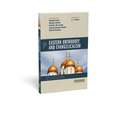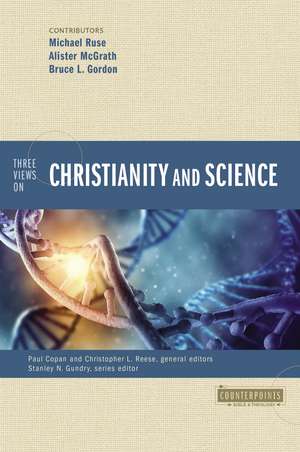Three Views on Christianity and Science: Counterpoints: Bible and Theology
Paul Copan, Christopher L. Reese Contribuţii de Michael Ruse, Alister E. McGrath, Bruce L. Gordon Autor Zondervanen Limba Engleză Paperback – 11 ian 2021
Outside the church, the myth of a backwards, anti-science Christianity is very common in popular culture and can poison the well before a fruitful dialogue can begin. Within the church, opposing viewpoints on the relation between Christianity and science often lead to division.
Three Views on Christianity and Science addresses both types of conflict. Featuring leading evangelical scholars, this book presents three primary options for the compatibility of Christianity and science and models constructive dialogue on the surrounding controversial issues.
The highlighted contributors and their views are:
- Michael Ruse, representing the Independence View - When functioning correctly, science and Christian theology operate independently of each other, seeking answers to different questions through different means.
- Alister McGrath, representing the Dialogue View - Though the natural sciences and Christian philosophy and theology function differently, they can and should inform each other.
- Bruce L. Gordon, representing the Constrained Integration View - Science, philosophy, and theology all contribute to our understanding of reality. Their interactions constrain each other and together present an optimally coherent and integrated picture of reality.
The Counterpoints series presents a comparison and critique of scholarly views on topics important to Christians that are both fair-minded and respectful of the biblical text. Each volume is a one-stop reference that allows readers to evaluate the different positions on a specific issue and form their own, educated opinion.
Din seria Counterpoints: Bible and Theology
-
 Preț: 119.55 lei
Preț: 119.55 lei -
 Preț: 119.72 lei
Preț: 119.72 lei -
 Preț: 130.78 lei
Preț: 130.78 lei -
 Preț: 87.23 lei
Preț: 87.23 lei -
 Preț: 107.24 lei
Preț: 107.24 lei -
 Preț: 122.23 lei
Preț: 122.23 lei -
 Preț: 105.14 lei
Preț: 105.14 lei -
 Preț: 123.05 lei
Preț: 123.05 lei -
 Preț: 105.14 lei
Preț: 105.14 lei -
 Preț: 100.92 lei
Preț: 100.92 lei -
 Preț: 121.41 lei
Preț: 121.41 lei -
 Preț: 81.90 lei
Preț: 81.90 lei -
 Preț: 93.33 lei
Preț: 93.33 lei -
 Preț: 110.42 lei
Preț: 110.42 lei -
 Preț: 81.64 lei
Preț: 81.64 lei -
 Preț: 93.84 lei
Preț: 93.84 lei -
 Preț: 94.01 lei
Preț: 94.01 lei -
 Preț: 113.78 lei
Preț: 113.78 lei -
 Preț: 131.78 lei
Preț: 131.78 lei -
 Preț: 96.46 lei
Preț: 96.46 lei -
 Preț: 137.77 lei
Preț: 137.77 lei -
 Preț: 106.58 lei
Preț: 106.58 lei -
 Preț: 125.97 lei
Preț: 125.97 lei -
 Preț: 130.96 lei
Preț: 130.96 lei -
 Preț: 152.26 lei
Preț: 152.26 lei -
 Preț: 129.92 lei
Preț: 129.92 lei -
 Preț: 128.39 lei
Preț: 128.39 lei -
 Preț: 165.81 lei
Preț: 165.81 lei -
 Preț: 126.66 lei
Preț: 126.66 lei -
 Preț: 130.13 lei
Preț: 130.13 lei -
 Preț: 111.83 lei
Preț: 111.83 lei -
 Preț: 126.86 lei
Preț: 126.86 lei -
 Preț: 126.86 lei
Preț: 126.86 lei -
 Preț: 107.04 lei
Preț: 107.04 lei -
 Preț: 126.66 lei
Preț: 126.66 lei -
 Preț: 147.25 lei
Preț: 147.25 lei
Preț: 104.31 lei
Nou
Puncte Express: 156
Preț estimativ în valută:
19.96€ • 21.68$ • 16.77£
19.96€ • 21.68$ • 16.77£
Carte disponibilă
Livrare economică 01-15 aprilie
Preluare comenzi: 021 569.72.76
Specificații
ISBN-13: 9780310598541
ISBN-10: 0310598540
Pagini: 224
Dimensiuni: 133 x 203 x 21 mm
Greutate: 0.18 kg
Editura: Zondervan Academic
Colecția Zondervan Academic
Seria Counterpoints: Bible and Theology
Locul publicării:Grand Rapids, United States
ISBN-10: 0310598540
Pagini: 224
Dimensiuni: 133 x 203 x 21 mm
Greutate: 0.18 kg
Editura: Zondervan Academic
Colecția Zondervan Academic
Seria Counterpoints: Bible and Theology
Locul publicării:Grand Rapids, United States
Descriere
When it comes to relating Christianity to modern Western culture, perhaps no topic is more controversial than the relationship between Christianity and science.
Outside the church, the myth of a backwards, anti-science Christianity is very common in popular culture and can poison the well before a fruitful dialogue can begin. Within the church, opposing viewpoints on the relation between Christianity and science often lead to division.
Three Views on Christianity and Science addresses both types of conflict. Featuring leading evangelical scholars, this book presents three primary options for the compatibility of Christianity and science and models constructive dialogue on the surrounding controversial issues.
The highlighted contributors and their views are:
The Counterpoints series presents a comparison and critique of scholarly views on topics important to Christians that are both fair-minded and respectful of the biblical text. Each volume is a one-stop reference that allows readers to evaluate the different positions on a specific issue and form their own, educated opinion.
Outside the church, the myth of a backwards, anti-science Christianity is very common in popular culture and can poison the well before a fruitful dialogue can begin. Within the church, opposing viewpoints on the relation between Christianity and science often lead to division.
Three Views on Christianity and Science addresses both types of conflict. Featuring leading evangelical scholars, this book presents three primary options for the compatibility of Christianity and science and models constructive dialogue on the surrounding controversial issues.
The highlighted contributors and their views are:
- Michael Ruse, representing the Independence View - When functioning correctly, science and Christian theology operate independently of each other, seeking answers to different questions through different means.
- Alister McGrath, representing the Dialogue View - Though the natural sciences and Christian philosophy and theology function differently, they can and should inform each other.
- Bruce L. Gordon, representing the Constrained Integration View - Science, philosophy, and theology all contribute to our understanding of reality. Their interactions constrain each other and together present an optimally coherent and integrated picture of reality.
The Counterpoints series presents a comparison and critique of scholarly views on topics important to Christians that are both fair-minded and respectful of the biblical text. Each volume is a one-stop reference that allows readers to evaluate the different positions on a specific issue and form their own, educated opinion.
Cuprins
Introduction – Copan and Reese 1.Independence View – Michael Ruse Responses – McGrath and Meyer Rejoinder – Ruse 2.Dialogue View – Alister McGrath Responses – Ruse and Meyer Rejoinder – McGrath 3.Qualified Agreement View – Stephen Meyer Responses – Ruse and McGrath Rejoinder – MeyerConclusion – Copan and Reese
